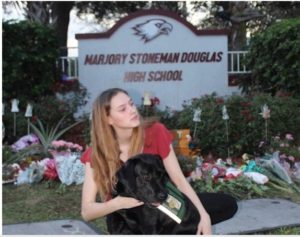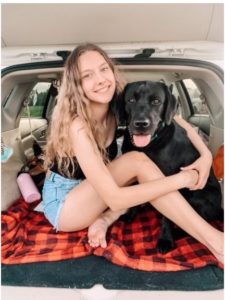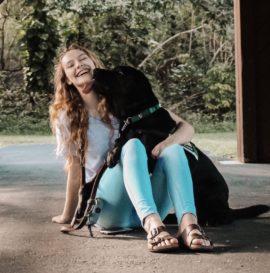Rising from the Ashes
In February 2018, a devastating shockwave swept the nation following a school shooting at Marjory Stoneman Douglas High in Parkland, Florida. The nation grieved with the suburban community’s loss of 14 students and three adults. For many of the students, returning to school after the incident proved difficult.
Julie, mother of Parkland survivor Brianna, recalls her daughter’s experience. “As a mom, it was very hard to see what she was going through, knowing that I could not fix it,” she said. “There’s only so much that I could do to help her as an individual. As a mom you want to fix everything and put a Band-Aid on it to make it go away. But that wasn’t something I could do.”
Brianna began attending therapy after the incident. She was diagnosed with PTSD. When Stoneman Douglas reopened, it saw an influx of service dogs on campus. That led them to begin considering a service dog for PTSD for Brianna. “We waited about a year after the event happened because we weren’t really sure,” Brianna said. “A lot of people were getting service dogs that I knew. But we didn’t want to make a rash decision. So, we went through therapy and took our time thinking about it to see if it would actually help.”
In October 2019, Brianna was matched, through New Horizons, with Biscuit, a 2-year-old lab. “Biscuit is trained to kind of ground me when I have a PTSD episode and alert me when I’m getting into it,” Brianna said. “Or, kind of look around a room to see if there’s any possible triggers.”
When Brianna is experiencing a trigger, Biscuit will begin DPT, or deep pressure therapy. This involves Biscuit using his weight and sometimes warmth to help minimize Brianna’s trigger. Remembering one of her episodes triggered by a code yellow drill at school, Brianna said, “I would have been a lot worse if he wasn’t there with me.”
In fall 2019, Brianna began facing obstacles bringing Biscuit to school. When Julie reached out to New Horizons, they put her in contact with Kristin Hartness, executive director of Canines for Disabled Kids. “New Horizons had given me this contact and said, ‘Hey, they’re very helpful. They can guide you, then can give you what you need’,” Julie said. “They (CDK) were wonderful. They told me exactly: they can’t ask that question, they can’t require this, they cannot deny you.” CDK offered Julie great personal support, acting as a sounding board when Julie felt that she was getting pushed against a wall and couldn’t get any further. “They were great listeners,” Julie said. “And just guided us along the way.”
A year later, Brianna and Biscuit continue their work together. As her mother, Julie could not be happier for her daughter. “The bond now that these two have is just amazing,” Julie said. “My worries have subsided knowing how much it has helped her. As a mom, it’s a relief to know that… OK, this is what she needed. This is a huge help to her. It made her more independent, way more independent.”
Now in the 12th grade, Brianna has hopes for her future. “I feel more independent, like I can do more things now that I have him,” Brianna said. Although she’s not sure she wants to go to college, she dreams of traveling. “Obviously with COVID-19 that’s a little hard,” she said. “But I know that before I would’ve been terrified to travel by myself. But now that I have Biscuit, I can go and know that he’s my sense of security so that I can travel however much I want.”
Brianna would like to educate others about service dogs. She might want to intern or work at a service dog facility in the future. Circling back to college, Brianna said, “If I do go to college or when, I won’t be alone.”
- Abigail Davis
Abigail (Abi) is a Professional Communication and Journalism student at University of Maine, Presque Isle (2020)












